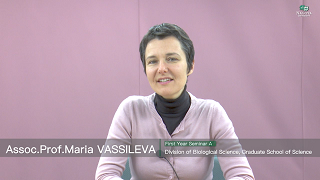First Year Seminar A

| Lecturer | VASSILEVA Maria Niko, Associate Professor |
|---|---|
| Department | G30, 2018 Fall |
| Recommended for: | 1st-year G30 students from Science, Engineering and Agriculture. |
Course Overview
This is one-semester long discussion-based seminar course. Students work in teams to research specific topics of interest and present them in class.
The aim of this course is to widen student's perspective on biology-related issues. The course is centered on several themes connecting biology with other sciences and social issues. The course will provide practice opportunities to organize and present one's viewpoint, and debate it at an open forum. Special emphasis is given to teamwork skills development and ability to provide feedback in a respectful manner.
One more integrated experience in this course is reading a book on a theme connecting biology with society (books provided by course instructor), and developing a book review to present in class.
Course Requirements
This course is officially open to 1st-year G30 students from Science, Engineering and Agriculture.
Textbooks
No textbooks are required for this course
Further details on course structure and content
A. In-class discussions and presentations structure:
For each class meeting students will be separated in groups randomly.
Each group will choose a topic within the theme designated for the class. Students are expected to do a research on the theme before hand and come prepared with one or several possible topics to work on. The actual topic is a choice of the group, below are only suggestions.
Groups are given 40 minutes to agree on a topic and brainstorm it.
Final goal: to prepare an informative presentation.
The presentation can be in any form the group finds appropriate, including but not limited to slides presentation.
Time limit for presentation: 15 min. (In case of presentation slides: Aim at max10 slides.)
Presentation Structure:
- Title (state clearly the topic)
- Main part (information on the topic, presented in logical sequences; objectively presented opposing opinions; references to the source of information)
B.Themes and suggested topics
(The topics are just to give a few ideas; any other topic within the theme is welcome)
- Biology and Chemistry, Physics, Engineering, Math
- How discoveries in Chemistry/Physics/Engineering/Math have shaped Biology research direction (discovery of microscope, X-rays etc.)
- How technology has changed the way we look at or make discoveries in Biology
- Biology and Arts
- How visual arts have contributed to the knowledge of Biology (ancient Egyptian/Greek sculptures and anatomy of human body, are anatomical drawings/
exhibits a form of art?)
- Our senses are filters of our ability to perceive the world around us - what implication this brings on art forms?
- How literature has been representing biology? What we can learn about biology from science fiction?
- Biology and Media
- How biological research is misrepresented on media and the effect this has on our lifestyle and life-long decisions; what knowledge/training in Biology do journalists
have?
- Evolution - how science is interpreted, its relation to religion and society
- How much of the history of science are we exposed to - political history has changed hot spots of scientific research (Greeks, Ancient China, Islamic world, Europe, US
etc.), yet we hardly hear about names of scientists outside the "western world".
- The science of marketing - emotions and branding; brands are taping into customers' emotions - how do they do that and why it works (limbic system/dopamine system and emotions, how this relates to entertainment)?
- Biology and Politics
- Has politics anything to do with biology?
- Has politics anything to do with agriculture?
- How contemporary political maps have been shaped by biological phenomena?
- How government policies have changed the way we grow - and consume - our food?
- Biology and Ethics
- What the philosophical notion of ethics has to do with biology? Or doesn`t?
- Where religious or cultural ethics/customs crashes with biological principles? What do we do (or do not do) to resolve it? Examples: heterosexuality, first-kin marriages,
cannibalism, use of experimental animals in science and pharma etc.
- Biology and Environment
- Environmental issues and economics
- Biodiversity and why it matters
- Is there really any global warming and do we really have to be concerned?
- Biology and Sex
- Biology of sex and culture of sex - same or different? What are the differences?
- Hormones and libido
- Sex is in the brain, perceptions of male and females - consent, abuse, porn
- Objectifications and rape - the culture, the perceptions, the history; what we do to stop that?
- Ovarian cycle and contraception, how do different methods of contraception work?
- Abortion - what is controversial about it and why?
- Biological explanation of love - and lust - are they the same or different?
Grading
Group and individual presentations form 40% of total grade for the course; individual participation in discussions is 40% of final grade, individual book review is 20% of final grade.
Course Schedule
| Session | Content |
|---|---|
| 1 | Introduction to course |
| 2 | Self-introductions |
| 3 | Biology and Chemistry, Physics, Engineering,Math |
| 4 | Biology and Arts |
| 5 | Biology and Media |
| 6 | Biology and Politics |
| 7 | Biology and Ethics |
| 8 | Biology and Environment |
| 9 | Biology and Sex |
| 10 | Free topic (students` choice of theme) |
| 11 | Free topic (instructor`s choice of theme) |
| 12 | Free topic (instructor`s choice of theme) |
| 13 | Book review presentations |
| 14 | Book review presentations |
| 15 | Book review presentations |
Last updated
May 17, 2020

